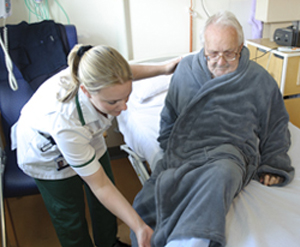Staying in Hospital
Going to Hospital

Health care today provides many opportunities to find solutions to your needs but this means it can feel complicated and confusing at times. Staff will help you whenever and wherever they can.
You and those caring for you are part of a team and therefore you are invited to contribute to your care at any time.
We have tried to answer most of the questions we anticipate you may have in this section, from preparing for your hospital stay; what to expect during your stay on the ward; information for your visitors, your medication and finally going home.
We also cover your rights, health & safety, identifying our staff and infection control. The links above will take you to the appropriate sections.
Personal belongings
If you have not been able to bring personal belongings into the hospital yourself, please take a look at this advice for loved ones about items to bring when visiting.
Personal belongings to bring when visiting
Translation/interpretation
If you need an interpreter, please let the ward know which service you need (this includes British Sign Language and lip-speakers for the deaf). There is no cost to people in our care.
Dementia Care

Learning Disabilities and/or Autism
If you or someone you care for has a learning disability and/or autism, there is assistance available:
- if you, or the person you care for, needs patient information in Easy Read/picture format
- if you would like to visit the unit or hospital to look around and meet staff before you come into hospital
- if you would like to discuss any issues that concern you
Please contact the Learning Disability Liaison Team on:
01225 824246
Safeguarding Office B10
Children's Centre
Royal United Hospital
Combe Park
Bath BA1 3NG
Or click below to find out more:
Leaflets for people with learning disabilities
Easy Read documents to support a person with learning difficulties to access hospital.If you or the person you care for has a Passport to Hospital Care, or sheet with personal information written down, that will help staff care for a patient better because we will be aware of their personal needs, please make sure you bring the information into hospital and give it to staff to put in the patient records for the hospital stay, so we can provide the best possible care.
General
Passport to Hospital Care - Learning Disability
Passport to Hospital Care - Autism
COVID-19 Hospital Passport to accompany Patient's Hospital Passport
Going to the Emergency Department
Single Sex Accommodation for Inpatients
Medical
Having your blood pressure taken
Outpatients
Having a Blood Test (for outpatients)
Radiology
Autism Links and Information
Autism Spectrum Disorders: Beyond the basics
www.uptodate.com
NINDS Autism Information Page
(National institute of Neurological Disorders and Stroke)
Autism Patient information
From the British Medical Journal Group
Information sheets and leaflets
Available from the National Autistic Society Helpline
Autism spectrum disorders from the Scottish Intercollegiate Guidelines Network
Booklet for Parents and Carers
Inclusion development programme: supporting pupils on the autism spectrum
www.gov.uk information
Easy Read Information about Autism
Provided by BILD
You may also like to look at:
Patient support and complaints
If you have any other questions or concerns about the care and attention you are receiving, please discuss this as soon as possible with the most senior person on duty.

